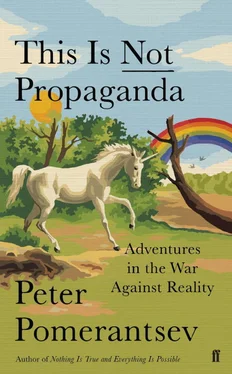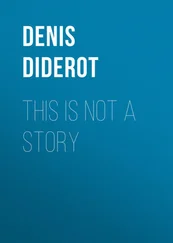At a moment of crisis for the protests Alberto had an idea. He knew the words that thickened the links between protesters. What if he could flood the Internet with them? He created a YouTube video. It was just a girl talking to camera, listing the reasons why the protests were important. But every word she said had been carefully scripted by Alberto, each one selected as a linguistic potion.
When the video went viral, protesters stopped being distracted by the cyborgs and began talking to each other again, repeating the words that brought them together. Alberto could see the quivering ball begin to coalesce again, the little bats pecking in vain.
‘That’s what I mean when I say the Internet is a great battle between love, interconnectedness on the one side, and fear, hate, disjointedness on the other,’ he explains.
After the cyborgs came the sock puppets, social media accounts that embedded themselves within the protesters’ online community and then manipulated it from the inside.
In 2017, when there were protests against a hike in gas prices, the sock puppets acted. Activists had been guiding protesters, helping them move around the city safely, avoiding the police and being beaten up. Now the sock puppets gave fake directions and pushed the protesters into the arms of the police. They spread fake stories that there had been violence and looting, posting photos of supermarkets with their windows broken – photos that had been taken of riots in other countries and relabelled as if they were in Mexico. Real criminals began to join the protests. This gave the police an excuse for violence.
And after the sock puppets came the online death threats against Alberto, the green laser beam shone into his apartment, his doorbell buzzing.
One takes such threats seriously in Mexico. During my visit Alberto asked me to meet him at the public gathering of Article 19, an international NGO that helps protect journalists (and which derives part of its funding from the democracy assistance complex, including Freedom House, the US State Department and European foreign ministries). At the Article 19 event the faces of murdered journalists were flashed up on the walls: eleven had been killed in the last year, with 99.75 per cent impunity for the perpetrators. The event was held in one of those russet-coloured colonial palaces in Mexico City where you are ushered into a cool courtyard of columns, arches and cloisters so tall and graceful they serve only to emphasise the sad context of the gathering.
As canapés were handed round, Ricardo Gonzales, one of the directors of Article 19, told me the story of a journalist from Reynosa, a city in the north-east.
In Reynosa the narcos controlled the local newspapers, which, like Soviet-era publications, talked only about how clean, peaceful and prosperous the city was, when the reality was drug shoot-outs, with locals getting caught in the crossfire of gun battles that officially did not exist. Then social media came and changed everything. A Twitter channel, Reynosa Follow, would give live updates on shootings. Reynosans warned each other where to avoid: ‘Two gunmen on the corner of 3rd and 5th, take an alternative route…’ Of course, everyone who contributed to the project did so anonymously, Ricardo explained. The narcos were offering money to anyone who would reveal the identity of those behind Reynosa Follow. They were particularly pissed off with an account named @La Felina, who had a picture of Catwoman as her avatar and who would even post photos of local narcos with demands for their arrest.
Then, one hot August day, a narco gang in Reynosa was caught up in a shoot-out and one of their men was hit and wounded. The narcos rushed him to the local hospital. Three doctors, two male and one female, were assigned to him. Nervous at being in a hospital too long, the narcos kidnapped the doctors and took them to a safe house to treat their wounded colleague – a common practice. They took the doctors’ phones. When they checked the woman’s, it opened up on @La Felina’s Twitter account. It turned out this plump, fifty-something medic treating their comrade-in-arms was the person they had been looking for. A few hours later @La Felina tweeted:
FRIENDS AND FAMILY, MY REAL NAME IS MARÍA DEL ROSARIO FUENTES RUBIO. I AM A PHYSICIAN. TODAY MY LIFE HAS COME TO AN END.
DON’T MAKE THE SAME MISTAKE AS I DID, YOU WON’T GET ANYTHING OUT OF THIS. I REALISED THAT I FOUND DEATH IN EXCHANGE FOR NOTHING. THEY ARE CLOSER TO US THAN YOU THINK.
Her last two messages were photos: one of her looking directly into the camera, the next of her lying on the floor with her face blown off. They had live-tweeted her execution. Then they replaced her Catwoman avatar with María del Rosario’s blown-off head.
The narcos like to show that information technology can’t be used to undermine them. One gang took a corpse and dressed him up as a carnival figure made up of computer parts: a keyboard to replace his mouth, CD-ROMs instead of eyes. The narcos were good at symbolism.
Given this context, Alberto decided it would be wiser to spend some time outside Mexico. He hid away in a nearby country.
At the next Mexican general election in 2017, the PRI lost to Andrés Manuel López Obrador, otherwise known as AMLO. Obrador promised to clean up corruption – but in his own way, top-down. He had little time for civic movements. He spoke the language of old-school state socialism and nationalism (though he quickly reached an accord with oligarchs to protect their assets). Alberto knew some of Obrador’s strategists and felt it was safe enough to return home. He liked the promises, but he was wary too. ‘Obrador also used bots in his campaign,’ Alberto told me. ‘I will be watching him.’ He felt the new government had been able to capitalise on the hard work of protesters, but would it listen to them when in power?
With the PRI out of power Alberto wanted to learn more about his adversaries. He’d heard that a part had been played by a campaign manager nicknamed Chochos, who was reputed to run an army of online trolls, bots and cyborgs. Chochos’s Facebook page was a grinning clown face. [10] Olver, Dulce, ‘El 81.3% de los ataques de bots en Edomex fueron contra Delfina, confirma otro análisis técnico’, 1 June 2017; https://www.sinembargo.mx/01-06-2017/3230408 . Gallagher, Eric, ‘Manipulating Trends & Gaming Twitter’, Medium, 18 December 2016; https://medium.com/@erin_gallagher/manipulating-trends-gaming-twitter-6fd31714c06c .
He agreed to talk to Alberto over Skype, but refused to show his face.
Though they were on opposing sides of the digital barricades, Alberto and Chochos spoke like two mutually respectful professionals swapping notes. When my translator transcribed their conversation, she kept getting confused over who was who.
Alberto asked about the fake pictures of looted supermarkets that had been spread during the gas protests, which had encouraged them to turn violent.
Chochos said he knew precisely who was behind those. It was a nineteen-year-old, part of a Facebook group called the Scientific Sect. Whenever one of their fakes would go viral they would celebrate. The media might talk about ‘organised cyber-criminals’, about ‘psychological warfare’, but it was just a bunch of kids, teenagers, who wanted attention.
Alberto told him how people had started coming round to his flat, ringing his bell…
Chochos shrugged it off. The kids created avatars for themselves which were intimidating on social media. Now they were getting the online world confused with the real one, pushing their avatars into reality. It was still all a game. The thing with Twitter is you can be whoever you want to be – a woman, a troll, an activist. You can play both sides of an argument, and no one will know. They weren’t, he insisted, actually violent.
Читать дальше












